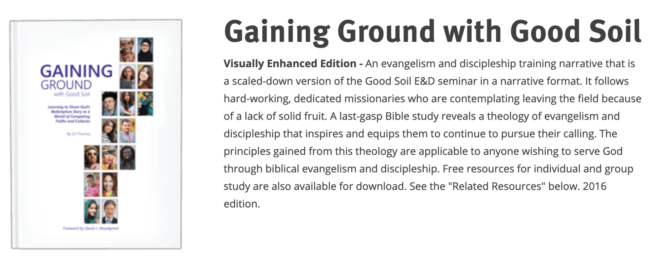How to Evangelize with Confidence - Overcoming Fear in Sharing Your Faith

In a random 2013 telephone survey of 2,083 adults in the United States, 100% of adults who identified as “evangelical Christians” agreed with this statement:
I, personally, have a responsibility to tell other people my religious beliefs.
The even more positive news from that survey was that 69% of these evangelicals agreed with this statement:
During the past 12 months, I explained my religious beliefs to someone who had different beliefs, in hope that they might accept Jesus Christ as their Savior.
But the negative side of that response was that nearly one-third (31%) of the evangelicals had not shared their faith in the previous year, even though they knew they were supposed to do so. And we can probably safely assume that some of the positive 69% were not being completely honest, wanting to sound better than they really were.
Ephesians 6:19-20 (ESV)
18 praying at all times in the Spirit, with all prayer and supplication. To that end, keep alert with all perseverance, making supplication for all the saints,19 and also for me, that words may be given to me in opening my mouth boldly to proclaim the mystery of the gospel,20 for which I am an ambassador in chains, that I may declare it boldly, as I ought to speak.
Why do Bible-believing Christians not share the gospel if they know it is a responsibility (and privilege) of being a follower of Jesus? Specific reasons may vary, but it generally comes down to fear—fear of not knowing what to say or how to say it, fear of imposing our beliefs on other people, fear of being rejected, fear of failure, or some other related fear. Moving from fearful to confident and bold may be easier than you would think.
Five “Confidence Factors” in Personal Evangelism
Most of the debilitating fears related to evangelism that evangelical believers commonly encounter can be resolved with increased confidence in five areas of their Christian experience. I call them “confidence factors.”
Confidence in What I’m Doing.
Lack of faith in the clear teachings of God’s Word often causes Christians to silently question the need to share the gospel with non-Christians. This insidious doubt begins to grow as we get our eyes off God and neglect to read and study the Bible regularly and meaningfully. The only way to regain confidence in our God-given task of evangelism is to get back into His Word and review what God says (1) about our responsibility and the (2) eternal lostness of people who die without trusting Jesus.
If you want to restore your passion for telling people about Jesus, re-study the teachings of Jesus about the realities of Hell and the Great Commission accounts. Then read carefully the book of Acts and observe how seriously early Christians responded to what they knew about what Jesus taught and commanded. As you read and study, ask God to give you an open and obedient heart to His Word.
Confidence in Knowing What to Say.
If I’ve heard it once, I’ve heard it dozens of times—“I’m afraid to witness to unbelievers because I just don’t know what to say.”
Sharing the good news of what Jesus did for us isn’t as hard as you might think it is. It doesn’t require a Bible education or years of studying the Scriptures. And, if you are asked a question that you can’t answer, most non-Christians will respect your “I’m sorry, but I’m not sure how to answer that question” acknowledgment. Just assure them that you will find the answer to their questions and get back to them with it.
And if you are totally at a loss as to what to say, just share your personal faith story (“testimony”)—how God changed your life. No one knows that story better than you.
To overcome the “don’t know what to say” fear, two helpful confidence builders are (1) training and (2) good resources. The Good Soil Basic Seminar, offered in May and October each year at the Association of Baptists for World Evangelism in New Cumberland, PA, has helped hundreds of Christ-Followers become confident personal evangelists.
Confidence in Knowing How to Say It.
Just because you know what to say, doesn’t necessarily mean you know how to say it. “How do I start?” “How do I steer the conversation?” “What do I do if the other person responds negatively?” “How do I bring my presentation to a close?”
Again, training is the best confidence builder in knowing “how to say it.” Post-training practice deepens and enhances the training. And gradually-amassed experience continues to strengthen confidence. Obviously, the most confident personal witnesses for Christ are generally those Christians who have been sharing the gospel for a long time. But, don’t be discouraged because you are not “there” yet. Get started now and feel your confidence grow. It’s an encouraging and rewarding experience!
Confidence in Knowing Which Resources to Use.
Confidence in knowing what to say and how to say it depends a lot of what, if any, evangelistic resources are used. Appropriately chosen gospel-sharing resources provide the basic content that you need to present to non-Christians. The best resources also provide the structure that helps you get started, keep on track, and bring the presentation to a close—a meaningful call for a personal faith response. If you are sharing the gospel without any printed resource, obviously you have to know the content, know how to structure the presentation, and know how to bring it to an invitation to accept Jesus as Savior. Even experienced personal evangelists can be more effective with Biblically-solid evangelistic tools.
The Story of Hope, published by Good Soil Evangelism and Discipleship, makes gospel presentations much easier because the content, structure, and invitation to respond in faith are all built into this evangelistic Bible study book. And, a free downloadable Leader’s Guide is available to help you be prepared and confident as you lead someone through this chronological Bible study that explains God’s redemptive plan.
Christians more experienced in evangelism often choose to use the Chronological Bridge to Life, especially with non-Christians who already have some gospel knowledge.
Confidence in God for the Results.
Now, we’re back to faith in God. We just need to faithfully do our part—share the gospel as confidently and clearly and lovingly as we can. It’s God’s job to produce conviction in the hearts of unbelievers and draw them to Himself.
Success, for us, in evangelism doesn’t necessarily mean that our unbeliever friend trusts Jesus at the end of our presentation. Whatever we can say or do that brings an unbeliever closer to personal salvation is a “win”—we call it “bumping someone up the scale.” What does that mean? Take a look at the “What is my role and what is God’s role in evangelism and discipleship?” section on the About Us page of the Good Soil website. After all, we all want to share our faith effectively. Right?

A great training resource related to this article is Gaining Ground. Learn more here!




